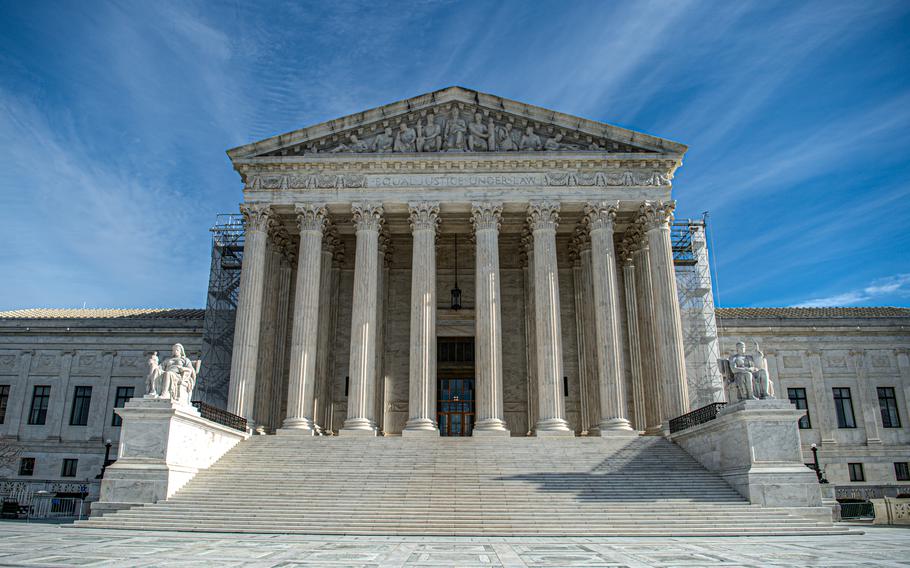
The Supreme Court unanimously ruled in favor of Marine Corps veteran Simon Soto, who filed a class-action lawsuit arguing the federal government incorrectly reduced the combat-related special compensation that he received after military service. (Carlos Bongioanni/Stars and Stripes)
WASHINGTON — Thousands of medically retired veterans are eligible for additional retroactive combat disability pay following a Supreme Court decision that ends a cap on compensation for individuals with less than 20 years of service.
The court unanimously ruled in favor of Marine Corps veteran Simon Soto, who filed a class-action lawsuit arguing the federal government incorrectly reduced the combat-related special compensation that he received after military service.
Under federal law, retired veterans waive a portion of their military retirement pay to receive disability benefits from the Department of Veterans Affairs.
But veterans receiving combat-related disability pay are an exception under a statute that Congress passed in 2008, according to the Supreme Court decision issued June 12.
Justice Clarence Thomas, writing for the court, stated, “Where, as here, the statutory scheme involves a small group of particularly deserving claimants, it is not extraordinary to think that Congress wished to forgo a limitations period.”
The National Veterans Legal Services Program, a nonprofit firm that represented Soto, estimated the court decision could affect up to 9,000 combat-disabled veterans.
Soto’s case had been pending before the Supreme Court since last fall. The court heard oral arguments in April.
Soto, a former corporal who is 100% disabled, had served from 2000 to 2006 with two deployments to Iraq before he was medically retired. Soto worked in mortuary affairs while on active duty. His job was to search for and recover U.S. war casualties, according to court documents.
“He struggled to adjust to civilian life following deployment and eventually received a diagnosis for post-traumatic stress disorder,” according to court documents.
PTSD is a mental health condition that can develop from witnessing terrifying events.
Soto filed for combat-related disability compensation in 2016. The payment is non-taxable, and retirees must apply to their service branch to receive it, according to the Defense Finance and Accounting Service at the Defense Department.
The Navy had granted Soto combat-related special compensation but incorrectly applied a six-year statute of limitation to calculate retroactive payments, giving him compensation back to 2010, according to the decision.
The Navy cited a federal law called the Barring Act.
Soto’s pay was backdated to July 2010 based on the Barring Act, which requires veterans to file compensation claims within six years of receiving a VA disability rating, according to court documents.
But the Supreme Court ruled there is no six-year cap.
Under a statute adopted by Congress in 2008, “a retired veteran who establishes that his disability is attributable to a combat-related injury may receive special compensation up to the amount of waived retired pay,” according to the court’s decision.
The Supreme Court stated: “The Barring [Act] establishes default settlement procedures for claims against the government and subjects most claims to a six-year limitations period. However, the act includes an exception: If another law confers authority to settle a claim against the government, that law displaces the Barring Act’s settlement mechanism, including its limitations period.”
“We are grateful that the Supreme Court recognized that Congress intended veterans to receive the full amount of their combat-related special compensation, no matter when they seek it,” said Paul Wright, director of the National Veterans Legal Services Program.
Sidley Austin, a private law firm headquartered in Chicago, and the National Veterans Legal Services Program filed a lawsuit in federal court in 2017 on behalf of Soto and similar veterans denied more than six years of retroactive combat disability pay.
“The court’s ruling ensures that combat-disabled veterans will receive all the combat-related special compensation they are entitled to by law,” said Tacy Flint, an attorney with Sidley Austin.
In 2021, a district court in Texas ordered the government to pay all military retirees whose combat-related compensation had been limited.
But a circuit court later reversed the ruling on appeal, prompting Soto’s attorneys to file a petition in 2024 with the Supreme Court.
“Because of this decision [by the Supreme Court], thousands of combat-disabled veterans will finally receive the full amount of the compensation they earned through their service,” Wright said.